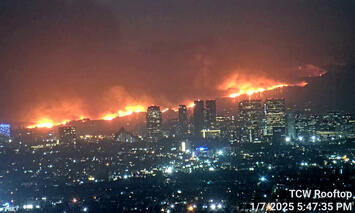
Scientific American blames the Los Angeles fires on climate change. A Yale University publication agrees. An article in Quartz predicts that climate change is going to make housing “uninsurable.” Instead of insurance, a New York Times op-ed by a former California insurance commissioner argues that oil companies should be forced to pay for fire damages.
It’s a neat argument that appeals to homeowners eager to blame the loss of their houses on anything other than their own decisions to buy or build flammable homes with flammable landscaping in a fireplain. Yet there are valid reasons to believe that climate change is not the issue, and that even if climate change is occurring, it won’t make homes uninsurable. In fact, people who believe climate change is the problem should be all the more interested in making sure that homes and landscaping are fireproof.
A key weakness in most of the arguments for anthropogenic climate change is that they rely on data that goes back only about 55 years or so. The 1970s were one of the coolest decades in the 20th century, so any data that start from there will make it appear that temperatures are rising. The Yale article cites one study that uses data back to 1971 and another that goes back to just 2001.
Both of those studies are also not of climate change but of fire data, but that’s problematic because the Forest Service and other wildland fire fighting agencies dramatically changed how they fight fires since the 1990s. Where they once risked firefighter lives by having them directly attack the fire fronts, they now do huge amounts of back fires and rely more heavily on aerial drops of water and retardant. This, not climate change, has increased acres burned and the sizes of the largest fires. Acres burned are a symptom of climate change, but they can also be a symptom of other factors as well.
Relying on actual climate data, rather than symptoms, climatologist John Christy has shown that heat waves in the West, the number of days over 100 degrees in California, and southern California rainfall have not particularly changed over the last 110 years. If anything, some of these indicators have cycled up and down, with the 1970s, as mentioned above, being a cool, wet period.
Even if you believe that climate change is the problem, blaming the oil companies is the wrong answer. For one thing, the oil that has been burned over the past century was burned by us, not the oil companies, who only sold it to us. More important, as Bjorn Lomborg showed in the Financial Post last week, recent studies have estimated that climate change is going to reduce global GDP by only 2 to 3 percent, while the actions climate activists want os to take to slow climate change will reduce it by 25 percent, both increasing poverty and making us less resilient to any changes that come about as a result of increased temperatures.
As I’ve noted here before, the main reason I am suspicious about the whole climate narrative is that most of the things that activists want us to do, such as spend more on mass transit or increase urban densities, won’t really reduce greenhouse gas emissions and are simply part of an agenda that existed long before climate was thought to be a problem.
Read the rest of this piece at The Antiplanner.
Randal O'Toole, the Antiplanner, is a policy analyst with nearly 50 years of experience reviewing transportation and land-use plans and the author of The Best-Laid Plans: How Government Planning Harms Your Quality of Life, Your Pocketbook, and Your Future.
Photo: The Palisades Fire on the evening of January 7, via Wikimedia by Toastt21.












